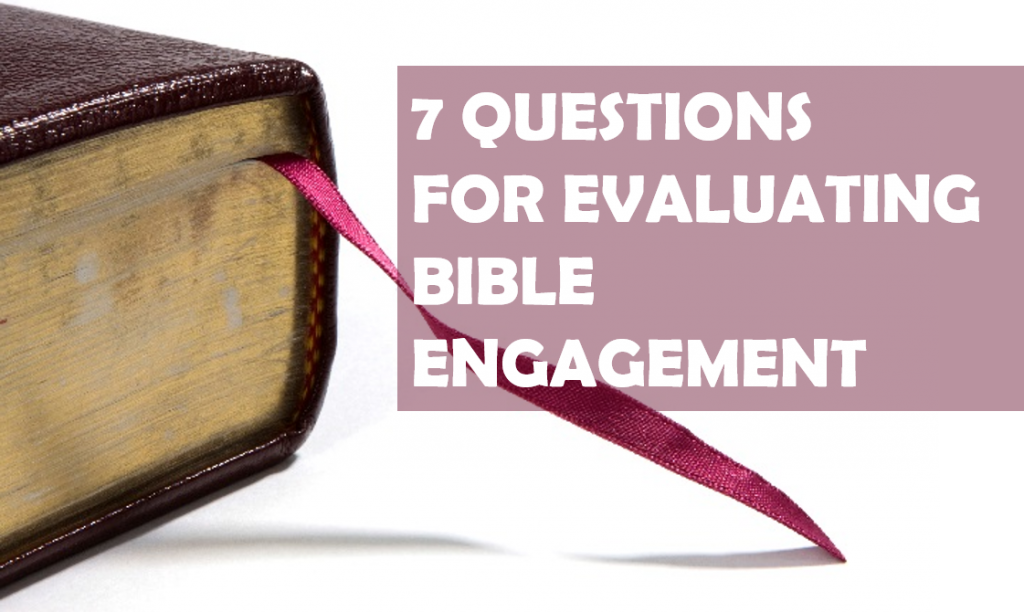
Left to its own devices, any open discussion with teens, no matter the starting subject, will usually flow to the question, “So how far is too far?” It’s a worthy question that needs a respectful response. But if we’re not careful, we can spend our teens’ entire youth ministry careers talking about sex (and other easy-discussion issues) and miss the opportunity to launch them on lifelong Bible engagement and its resulting intimacy with God.
- Is God doing the talking?
It’s His Word. Can you hear Him speak? God has something to say to us in every verse of the Bible (2 Timothy 3:16), even those obscure, funky verses. If we let our fears take over, i.e., fear of the attention span of our middle schoolers or the dreaded eye-roll form our high schoolers, we lose confidence in trusting a big, ancient book of text to hold the attention of our middle schoolers or be seen as relevant to our high schoolers. When God does the talking, He will hold their attention and define relevance. A key gauge: are students interacting with the Scripture (using myriad ways noted below) more than they are interacting with my take on the Scripture (or anything else I think I need to “make” the Bible relevant)?
- Have I experienced this, too?
We know the best case scenario: Disciple out of our personal overflow. We also know this is a guilt trip waiting to happen. Or a guilt-trip that has happened. We’re over-tasked and over-scheduled. But there is a principle we can’t ignore: God works through gifted leaders (Ephesians 4:11-12). There is no substitute for a teacher or leader who has allowed God to equip him or her (Hebrews 13:20-21) through earnest preparation. Here, then, is where we might be able to pick up a tail wind: let your preparation for leading discipleship serve as your personal time with God. You’re not preaching a sermon. You are doing life-as-it-happens ministry with teens. Don’t short-cut your personal time with God nor your prep for student discipleship. Put the two together.
- Have I considered learning styles?
We tend to teach/disciple out of our own learning style. But our students may have very different learning styles. Consider integrating different learning styles from week to week and keep in mind that different parts of the Bible lend themselves to different learning styles.
| Learning Style | Bible Idea |
| VISUAL (spatial):
Prefers using pictures, images, and spatial understanding. |
-Use video to support the passages you’re exploring.
-Ask students to create diagrams that explain theological concepts. -Use colors and symbols to explore passages. -Actually use the maps in the back of their Bibles. |
| AURAL (auditory-musical):
Prefers using sound and music. |
-Connect songs and worship experiences to key Bible observations and applications.
-Create mnemonic tools for remembering lists in verses (e.g., fruits of the spirit) and points of application. |
| VERBAL (linguistic):
Prefers using words, both in speech and writing.
|
-Provide opportunity for students to discuss concepts with each other.
-Ask students to journal their thoughts about points of application. -Give students opportunity to teach what they’ve learned. |
| PHYSICAL (kinesthetic):
Prefers using your body, hands and sense of touch. |
-Act out narrative and parables.
-Ask students to create Play-Doh sculptures or draw images that reflect their takeaway from a passage. -Make your room a map. |
- Have I offered the next steps?
It’s a repeated rhythm throughout Scripture: hear and do. From Deuteronomy to Jesus to James we are exhorted to not only observe, understand, and hear the Word of God, but also to heed it, put it into practice, and do it. Every Bible experience can end with this question: What do I need to do? Maybe there is an internal attitude or perspective to adjust. Maybe there is an external behavior to change. Or maybe there is a caring of “the least of these” that needs to happen.
- Have I invited the hungry?
Since God draws people to Himself (John 6:44-45), a key role in launching a Bible effort is to pray for God’s Spirit to move on the hearts of your students. Not everyone is ready for a deeper Bible experience. If we try to make one size fit all, we will teach to the lowest common denominator of spiritual maturity and the hungry students will be left hungry. Through personal contact and voluntary sign-up, you will be aware of the students being nudged into a deeper walk with God.
- Is there opportunity for self-discovery?
Truth has its best chance for lasting impact when it is personally discovered. Before meeting with your students ask these questions: Am I simply regurgitating what I’ve found? Am I robbing students of any self-discovery? How can I help students find key points on their own? Just these questions can transform a mild devotional exercise into a life-transforming experience. Trust God’s Word to do what it says it can do (Psalm 19) and get out of the way. There is great payoff for the diligent search (Hebrews 11:6).
- Can they do this on their own?
We all know the adage: Give a man a fish, you’ve fed him for a day. Teach him how to fish, you’ve fed him for a lifetime. This adage is never more true than with teen Bible engagement. Every Bible experience we have with our students is an opportunity to make a deposit into a lifelong pursuit of God. The writer of Psalm 119 had an obvious soft heart for the Word of God and was on a lifelong pursuit of knowing (and obeying) God through His Word. Curiously, about every 30th verse in this psalm, on average, the writer pleads in various ways for God to teach Him. The pursuit of the knowledge of God, and its resulting intimacy with God, is a lifelong pursuit.